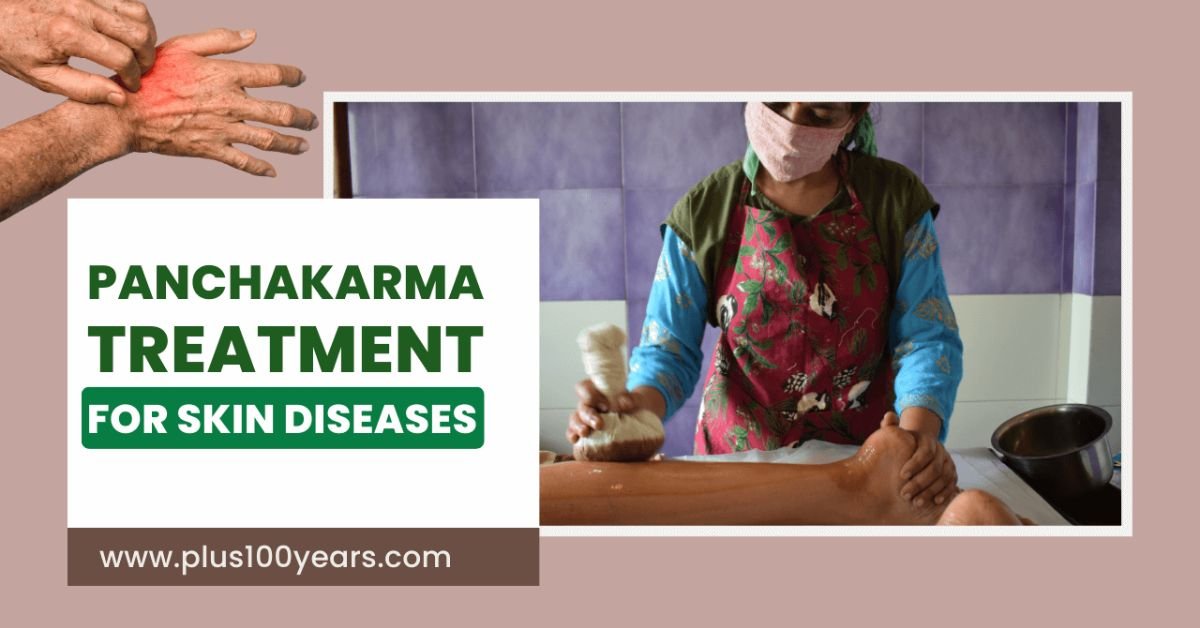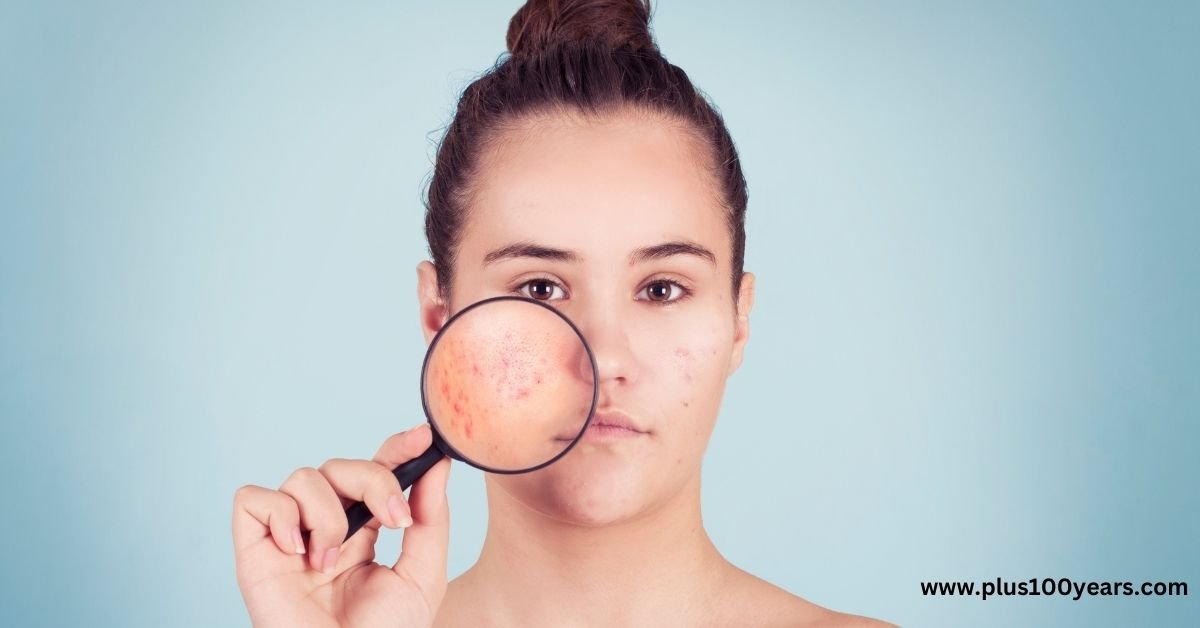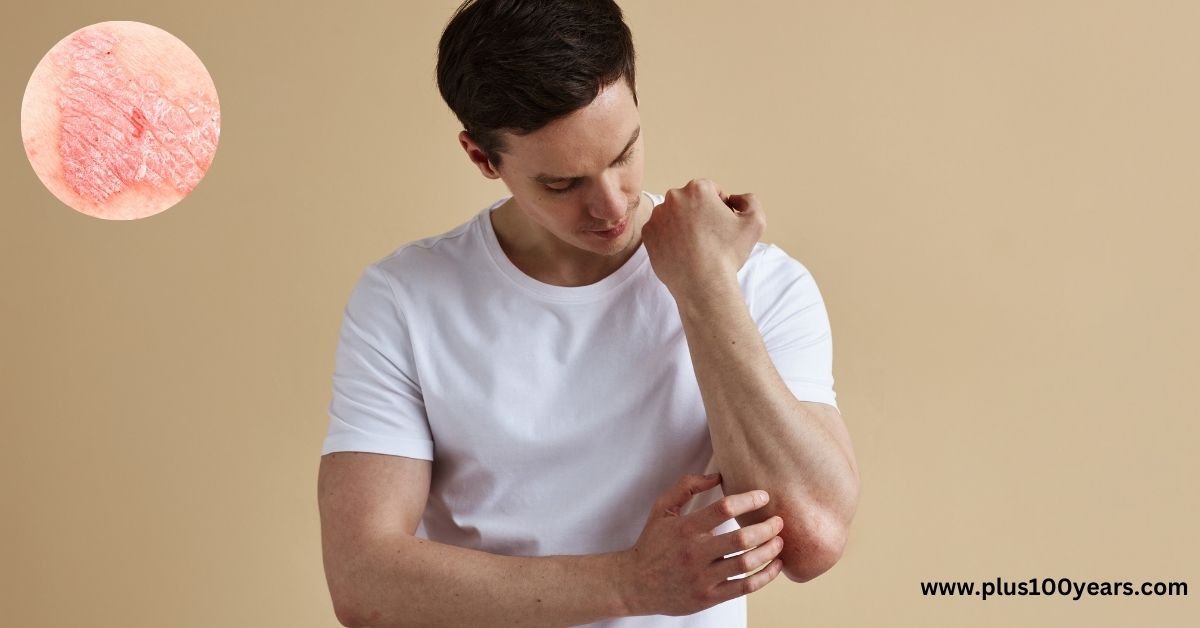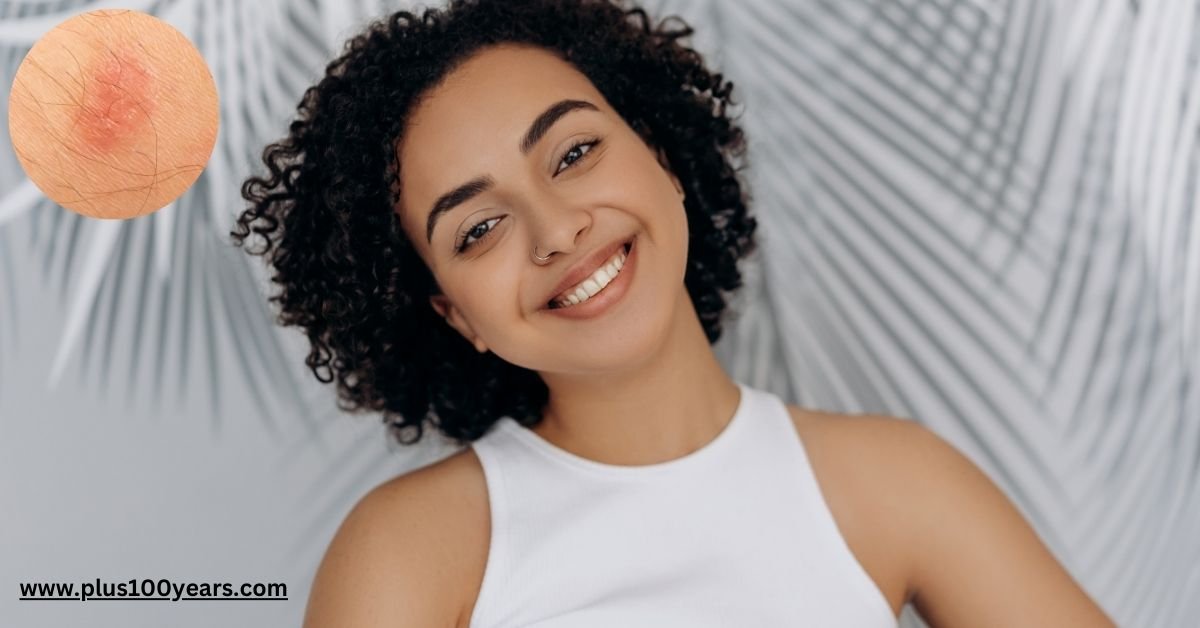Updated: 11-09-2025; Author: Dr.Vaidya Nachiket Kotecha, Consultant Physician and CEO – Chakrapani Ayurveda Hospital, Jaipur.
Skin Diseases are not just about health, but they also hurt our confidence. It can be stressful to deal with issues like eczema or acne.
Panchakarma, a natural therapy used in Ayurveda, cleanses the body and provides long-lasting, safe relief from skin issues.
In this guide, we will explain what Panchakarma is. Additionally, we will discuss how Panchakarma helps with skin problems, the main treatments involved, and provide safety tips.
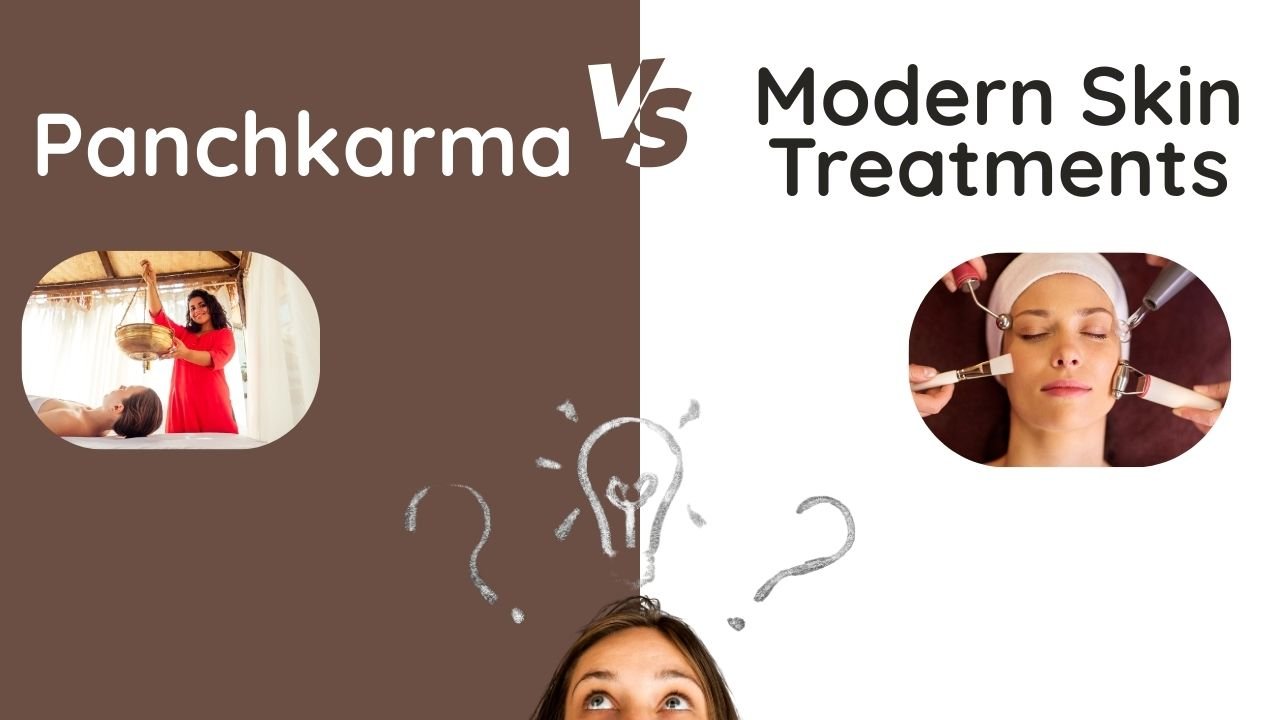
What is Panchakarma and Why Does it Matter for Skin Health
Panchakarma means “five actions.” It is an ancient Ayurvedic treatment that cleanses the body and maintains balance among the three doshas (Vata, Pitta, Kapha).
- According to Ayurveda, many skin problems arise from excess toxins and heat in the body, often due to Pitta imbalance. These toxins block small body channels and lead to issues like pimples, rashes, itching, or dry skin.
- Panchakarma helps remove these toxins and cleanses the body, allowing the skin to heal naturally. It’s like cleaning rusty pipes so that water can flow smoothly. In this case, it is the body’s channels that get cleared.
Common Skin Diseases Panchakarma Helps With
1. Psoriasis
A skin problem that causes red patches with white or silvery flakes often returns after regular treatment. Panchakarma helps by cleaning out toxins and calming excess Pitta in the body, providing longer relief.
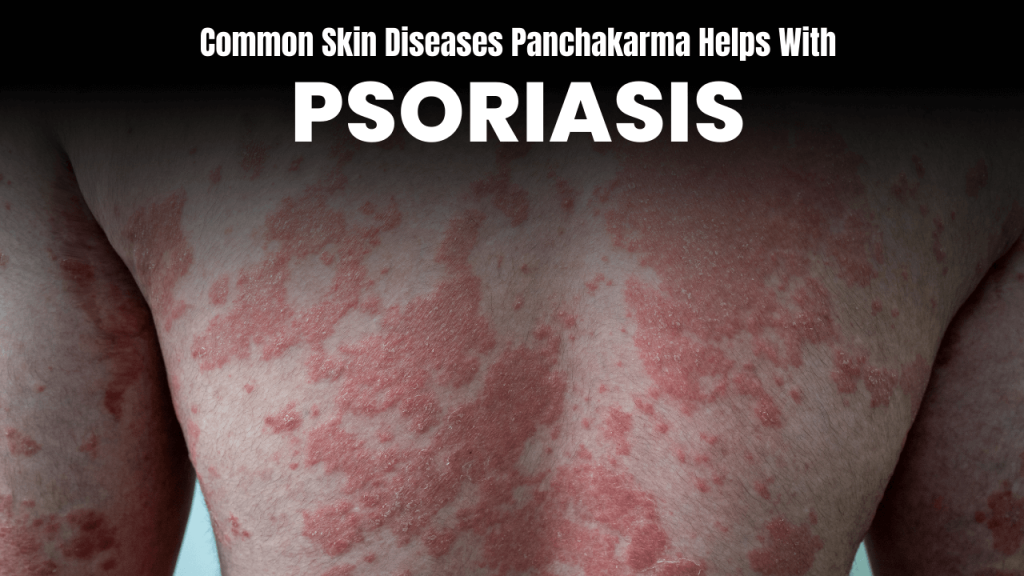
2. Eczema / Dermatitis
It causes red, itchy, and dry skin patches that can disrupt sleep and comfort. Panchakarma removes toxins, balances the body, and calms the skin naturally.
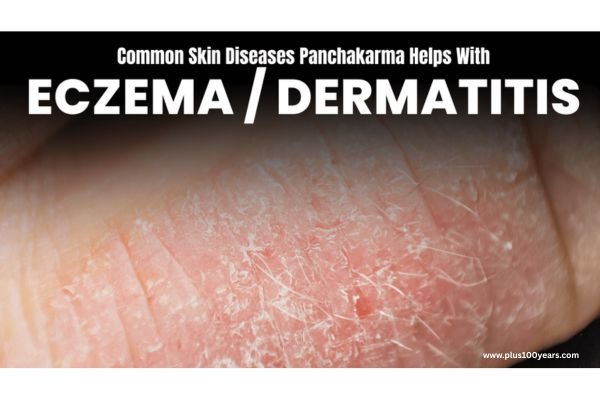
Pimples are caused by hormones, oily food, or stress, and they can leave scars. Panchakarma cleans the blood, controls oil, and helps reduce pimples.
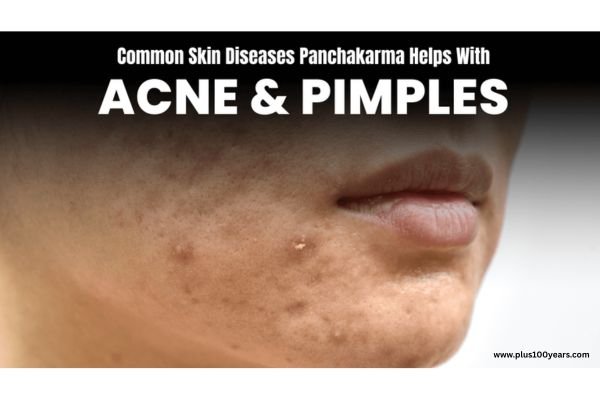
Pimples are caused by hormones, oily food, or stress, and they can leave scars. Panchakarma cleans the blood, controls oil, and helps reduce pimples.
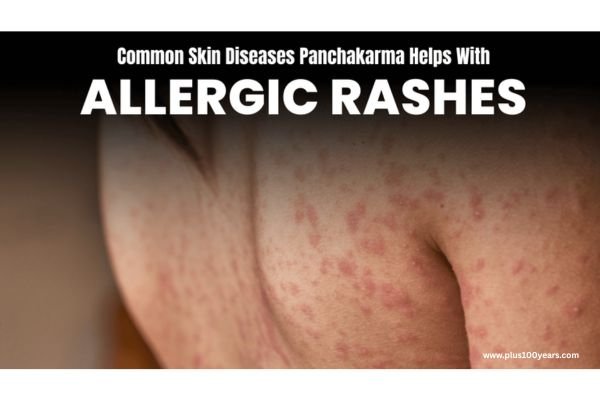
Like ringworm or itchy patches, they grow in damp areas and keep returning. Panchakarma builds inner strength and helps prevent repeated infections.
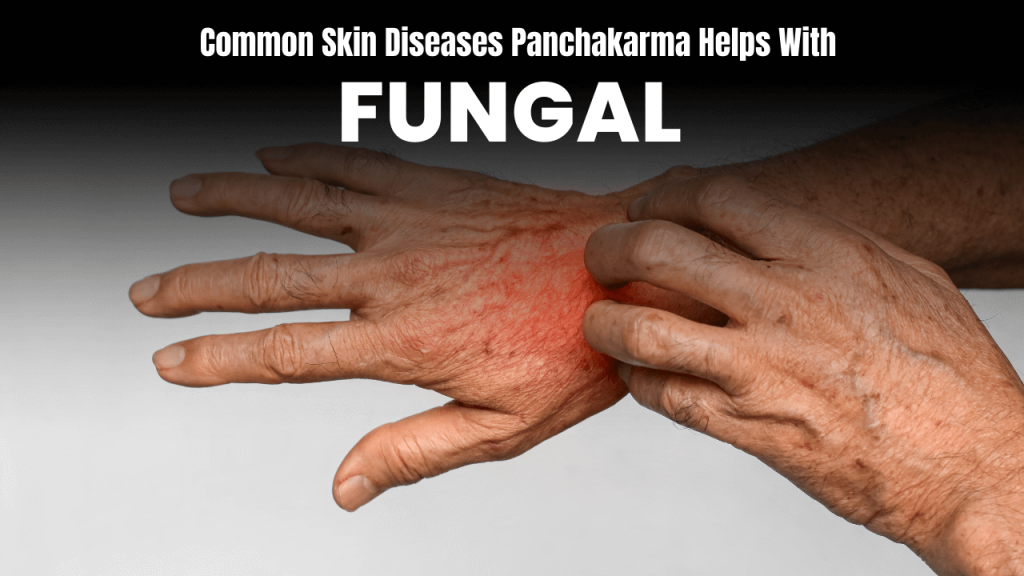
Panchakarma Therapies for Skin Diseases:
Each Panchakarma therapy has a specific role in skin care:
✅ Vamana (Therapeutic Emesis)
This treatment induces vomiting in a controlled manner to eliminate excess Kapha and toxins. It helps with oily skin, acne, allergies, and certain fungal infections.
✅ Virechana (Therapeutic Purgation)
Herbal medicines are used to cleanse the stomach and intestines. It is very helpful for Pitta issues like psoriasis, eczema, and skin rashes. It cools the body and purifies the blood.
✅ Raktamokshana (Bloodletting Therapy)
This traditional method removes bad blood from specific areas of the body. It is effective for persistent skin problems like psoriasis, eczema, and acne.
✅ Basti (Medicated Enemas)
Medicines are administered through the rectum to detoxify the colon. It benefits Vata issues like dry skin, itching, and cracks.
✅ Nasya (Nasal Therapy)
Herbal oil is applied to the nose to eliminate toxins in the head region. It helps with acne, hair loss, and skin allergies caused by sinus problems.
Supporting Ayurvedic Practices for Healthy Skin
Along with the main Panchakarma procedures, supportive therapies enhance healing:
✅ Oil Massage (Abhyanga): Improves circulation, nourishes skin, and removes dryness.
✅ Herbal Steam (Swedana): Opens pores, eliminates toxins through sweat.
✅ Herbal Pastes (Lepa): Turmeric, neem, sandalwood, and manjistha pastes calm itching and redness.
✅ Diet & Lifestyle:
▶️Prefer light, cooling foods like fresh fruits, green vegetables.
▶️ Avoid oily, fried, and junk foods.
▶️ Use spices like turmeric and cumin.
▶️ Regular yoga, pranayama, and stress control are key to clear skin naturally.
Benefits of Panchakarma for Skin Diseases
✅ Deep Detoxification & Blood Purification
✅ Reduced Itching, Redness & Dryness
✅ Natural Glow and Healthy Skin
✅ Long-term Relief vs. Symptom Suppression
✅ Calmer Mind & Stress Relief, as skin health is deeply linked to mental well-being.
Safety, Risks, and Who Should Avoid Panchakarma
While Panchakarma is highly effective, it is not for everyone. It must be done under an Ayurvedic doctor’s guidance.
✅ Not suitable for pregnant women, very weak patients, or during acute infections.
✅ Incorrect procedures at unqualified clinics may cause complications.
✅ Always choose a certified centre like Chakrapani Ayurveda Hospital in Jaipur, which has trained physicians and authentic therapies.
✅ For instance, in Jaipur, many people consult Chakrapani Ayurveda Hospital, a well-regarded Panchakarma centre known for authentic Ayurvedic treatment
Panchakarma vs. Modern Skin Treatments
✅ Dermatology: Provides quick symptom relief with creams, steroids, or antibiotics but flare-ups often return.
✅ Panchakarma: Aims for root-cause correction through detox and balance, giving sustained benefits.
✅ Best approach: use Ayurveda as a complementary, holistic healing for skin while respecting modern dermatology.
FAQs About Panchakarma Treatment
Can Panchakarma cure psoriasis permanently?
Ayurveda does not claim “permanent cures” but offers long-term relief and reduced recurrences by removing root causes.
How many days does Panchakarma take?
It varies—usually 7 to 21 days depending on skin condition and body type.
Are there any side effects?
When done by qualified doctors, it is safe. Wrong practices without supervision can lead to fatigue or dehydration.
Is it safe for children?
Mild Panchakarma therapies can be adapted for children, but only after an Ayurvedic physician consultation.
Conclusion
Skin diseases show what’s going on inside the body. Creams may mask the issue, but Panchakarma treatment for skin diseases addresses the root by detoxifying, balancing doshas, and restoring natural beauty.
With proper guidance, it clears the skin and calms the mind.
If you or someone close to you deals with chronic skin problems like psoriasis, eczema, or acne, talk to a certified Ayurvedic expert. For genuine care, Panchakarma centres in Jaipur, such as Chakrapani Ayurveda Hospital, are known for their skills in holistic skin healing.
Author Bio
Written by Vaidya Nachiket Kotecha, Consultant Physician and CEO – Chakrapani Ayurveda Hospital, Jaipur.
References:
- Charaka Samhita – classical Ayurvedic text.
- World Health Organisation (WHO) – Traditional Medicine and Ayurveda reports.
- Research articles on Panchakarma and skin diseases published in AYU Journal and PubMed.

